The recently-issued Paramount Home Video DVD of the 1953 War of the Worlds, one of the most beautifully photographed Technicolor movies ever made, looks absolutely breathtaking. This sci-fi classic provides one of the lushest color-baths in Hollywood history and has always looked sumptuous…now it’s heavenly.
But there’s an unfortunate side effect to this clarity. The new DVD (released on 11.1) pretty much ruins the suspension-of-disbelief element because of the way- too-visible wires holding up the Martian spaceships. You can see them repeatedly during scenes of the initial assault against the military…a thicket of blue-tinted wires holding up each one.
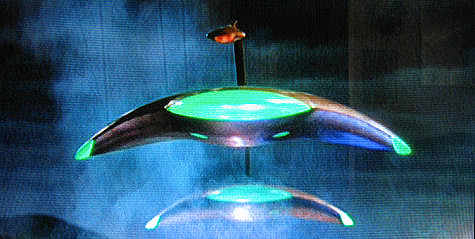
You can see the wires in this photo (taken off my own TV) but if you have any kind of recently-manufactured big-ass flat screen, they look much more vivid than indicated here
And there’s no believing it. The wires are much too vivid. Clayton Forrester (Gene Barry) is explaining to General Mann (Les Tremayne) how the Martians keep their bright green ships aloft, that they’re using “some form of electro magnetic force” and “balancing the two poles” and so on, and it’s absurd. The illusion is shot.
The obvious solution is for Paramount Home Video to digitally erase the wires. It would make perfect symmetrical sense. Just as digital technology has made this 1953 film look sharper than ever before, it follows that digital technology needs to recreate the original illusion. The wires weren’t that visible 52 years ago, and they weren’t as visible in Paramount Home Video’s 1999 DVD.
I can’t believe there are people who feel that wire-erasing would be a violation of the original film and are actually arguing against a fix-up, but they’re out there.
One of those naysayers is the highly respected and very bright Glenn Erickson (a.k.a., “DVD Savant”). I’m stunned that a smart guy like Erickson could be so dead friggin’ blind.
“Many scenes [in War of the Worlds] that appeared blurry or poorly composited [before] are now crystal clear,” Erickson said in a review posted 13 days ago. “This means that the forest of fine wires supporting the fighting machines is now more visible than ever, so we can’t have everything.
“There was no CG wire removal in 1953,” he writes, “and it would be detrimental revisionism to change the picture now. Today’s enlightened filmmakers like George Lucas would never do such a thing! So be an adult and learn to live with it.”
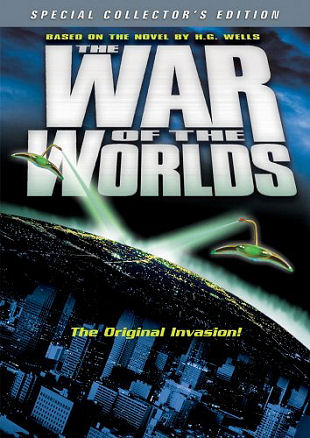
Uh-huh. Suppose George Pal and Bryon Haskin couldn’t do anything to hide the wires in their film, and 1953 audiences could therefore see them as clearly as DVD watchers can now? Would Pal and Baskin have just shrugged and told Paramount and the exhibitors, “Sorry, guys… learn to live with it…it’s the best we can do”?
Obviously the new DVD is the provider of “detrimental revisionism” — it’s showing an image that wasn’t meant to be seen.
Obviously, clearly…hello?…erasing the wires will enable audiences of today to suspend their disblief with the same ease that audiences did 52 years ago. You can’t muddy up the image so they can’t be seen, so it’s the only thing to do.
I’m going to be charitable and consider the possibility that Erickson may be over- worked and wasn’t thinking all that clearly when he wrote what he wrote. All is forgiven if he recants.
John Lowry, the head of Lowry Digital who’s done some great clean-up and/or digital restoration work on loads of classic films, was the one hired by Paramount Home Video to clean up War of the Worlds .
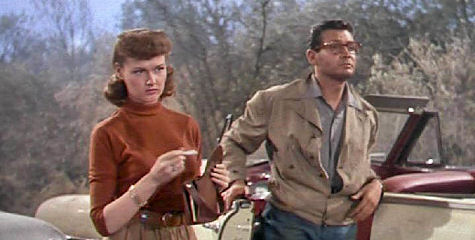
Ann Robinson, Gene Barry in War of the Worlds
“Our job is always to serve the wishes of the client…we do what the client says …and we didn’t have orders to clean up the wires,” he says. “Plus we were working on a very tight budget.”
Lowry faced a similar issue when he was doing the digital remastering ofAlfred Hitchcock’s North by Northwest. “We were working onthe scene when the crop duster plane crashes into the gas truck,” he recalls, “and there were 25 or 30 frames of that particular shot in which you could see three wires holding up the rather large model of the airplane.
“And I said to myself, my God, too obvious…it spoils the illusion. And I asked myself, what would Hitchcock do? I knew what he would do. Take the wires out of there. So I did, and the Warner Bros. people approved.
“But ever since then we’ve been very attuned to original artistic intent. And with today’s technology, anything that interferes with the story-telling process or which degrades that process, is dead wrong.
“We got rid of the wires on the Mary Poppins DVD, for the Disney people. We asked and they said ‘get rid of them’ but they had the money to do it.
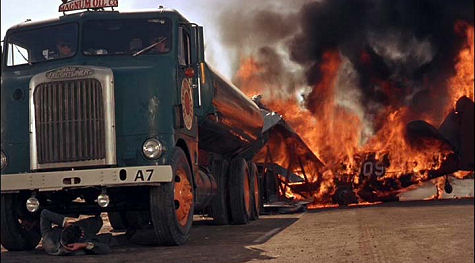
“When we were working on the snake-pit scene in Raiders of the Lost Ark you could see all kinds of reflections in the glass separating Ford from the snakes, and there was a very conscious decision made by Spielberg to take the reflections out.”
I called and e-mailed a few other guys who should have opinions about this story — restoration master Robert Harris, director and War of the Worlds fan Joe Dante (who riffs about the film on one of the DVD’s two audio tracks), and film restoration artist Mike Arick.
I’ll probably add to this story on Monday if any of these guys reply.
Grabs
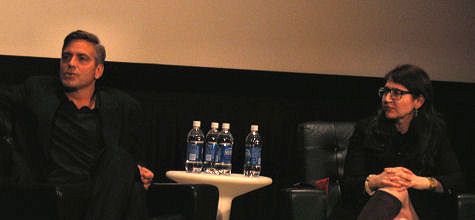
George Clooney, New York Times editor-writer Lynn Hirschberg during a discussion at theatre #10 in Hollywood’s Arclight theatre complex — Saturday, 11.12.05, 4:35 pm. One piece of news that emerged is that Clooney is looking to direct a film currently being written by Joel and Ethan Coen called Suburbacon. Another is that he’ll direct but won’t act in the upcoming televised re-do of Network. He said it took him only about a month to gain 35 pounds for his role in Syriana. I told him I’d been told prior to seeing it by a critic friend that “Fat Clooney is one of the best [performances] that you’ll see this year”…and he was right.

Sunset Blvd. near Cole, looking east — Saturday, 11.12.05, 2:10 pm.

Pico Blvd. and La Brea Avenue, looking south — Saturday, 11.12.05, 6:40 pm.
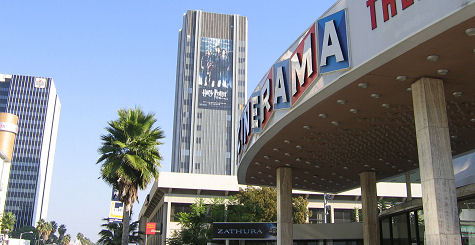
In front of Arclight Dome theatre — Saturday, 11.12, 2:05 pm

Looking down on the Arclight lobby — Saturday, 11.12, 3:25 pm
Bring It On
Shoot any kind of outdoor footage of the Middle East (especially in Iraq, Saudi Arabia, Afghanistan, et. al.) and you get the same flat terrain…aflame, parched, bleachy…which makes for a kind of atmospheric monotony.
But movies shot there (or which happen there) don’t have to be dull. The Middle East is the dramatic boiling pot of our times. It’s just a matter of going there and absorbing the particulars and pruning them down into something fitting and well- sprung.
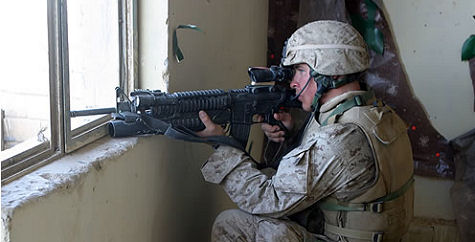
U.S. soldier involved in fighting in Falujah in ’04
I’ve recently seen a no-pulse, no-conflict, Waiting-for-Godot Middle East film (Sam Mendes’ Jarhead) and a complex, multi-layered, altogether fascinating one about the pernicious social and political political effects of big oil (Stephen Gaghan’s Syriana)…and leapin’ lizards, talk about a night-and-day response.
I’ll be waiting until 11.23 before running a Syriana review, but it’s obviously a far better film.
Jarhead was so bad and so nothing that it would feel almost refreshing to see a real Middle East war movie — a half-real, half- fictional narrative about the current conflict in Iraq, say. And why not? It’s time.
Hollywood didn’t feel safe about making Vietnam movies until 1978, and the first major Gulf War movie — David O. Russell’s Three Kings — didn’t happen until ’99, or about eight years after the fact. But the concepts of lag-time and the usual “gee, can we get into this?” no longer apply.
The reality of instant digital commnunications means that dramas (or black come- dies) about current military conflicts need to be shot and rescrambled with some urgency. Waiting around won’t do. Immediacy may not be the whole game, but it matters as much as anything else.
Syriana, which Gaghan researched in the Middle East for a full year, is a geo-political spellbinder that doesn’t feel the least bit dated. The story could have happened last summer, or even a year or two from now.
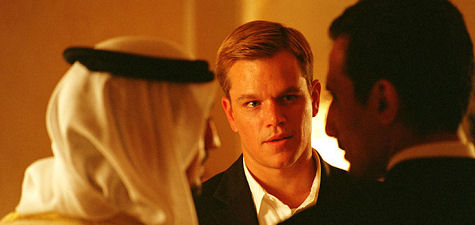
Matt Damon (center) in Stephen Gaghan’s Syriana (Warner Bros, 11.23)
Steven Bochco’s Over There, the first dramatic TV series about an ongoing war, much less one about U.S. troops in Iraq, had its debut on FX last summer. And Hany Abu-Assad’s Paradise Now, a respected film about a couple of would-be Palestinian martyrs, has a ripped-from-right-now quality.
Why not an Iraq War feature right now? Write it, shoot it…sort it out as you go along.
A writer-director of some vision and gumption needs to visit Iraq, get imbedded with the grunts like Gunner Palace‘s Michael Tucker did, soak it up, write it down, find the funding and make a feature film about what’s eally happening in that hell-hole.
Shoot the atmospheric stuff right there, maybe bring some of the cast over…risk it, dodge the bullets, burrow in. And then wrap it, cut it and open it quickly.
If Oliver Stone was the Oliver Stone of the mid to late ’80s, he’d be the guy to do this.
If Italian actor-filmmaker Roberto Benigni (who won a Best Actor and Best Foreign Film Oscar for Life Is Beautiful) can make an Iraqi War film, why can’t Americans?
Benigni just opened a comedy set against the backdrop of the Iraq conflict, althou- gh it was shot in Tunisia. An admired film (if not quite the anti-American rant some of his Italian fans had expected), The Tiger and the Snow opened on 10.14 in Italy and will debut in France in mid-December and probably open here during the first six months of ’06.
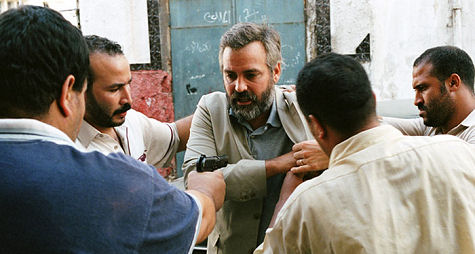
Syriana uncertainty: George Clooney’s CIA agent between a rock and hard place
A U.S.-produced drama about the current conflict obviously wouldn’t have to be shot in the streets of Baghdad or Fallujah.
A satisfying film for me would probably have to be something like Syriana or Traffic — a multi-character, five or six-plot-thread piece. I’m not going to try and dream up a story here and now, but it would either need to be a Costa Gavras-type condem- nation piece, or one that shows balanced compassion for U.S. troops as well as Iraqi locals.
Has anyone out there written a script or heard of a good one making the rounds? Is there a military veteran, freelance journalist and/or contract engineer who’s been to Iraq within the last couple of years who’s published stories or recollections on a site that could be made into a good script?
If there’s anything really good that’s been put into script form, or if anyone’s heard of something exceptional making the rounds, please advise.
Aniston Martin
Derailed has been handed a Rotten Tomatoes death sentence — only 19% of the critics approve. But it’s only somewhat bad because of certain hard-to-swallow developments that I won’t divulge. And it’s been well directed by Mikael Halfstrom, and by that I mean it feels solid, assured, nicely shot and well-cut.
Thrillers of this sort often get trashed by critics but supported by paying audiences. An agent told me this morning that Derailed, which opened today, has been doing well in New York theatres.
Like Fatal Attraction and Unfaithful, Derailed is a cautionary thriller about what happens when you cheat on your spouse.
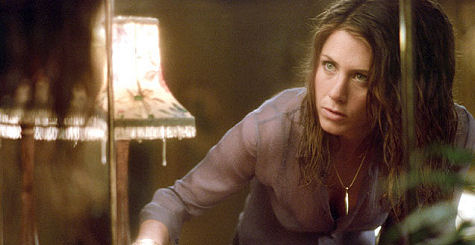
Jennifer Aniston in Mikael Halfstrom’s Derailed
Clive Owen plays a Chicago advertising guy who succumbs to temptation after meeting Jennifer Aniston, a blue-chip financial consultant, on a commuter train. But then they get robbed and assaulted by Vincent Cassel in a seedy hotel room before they get down to it…
I’m not going any further, but Cassel basically becomes Bruno Antony to Owen’s Guy Haines (the two leads in Hitchcock’s Strangers on a Train), and I’d be lying if I said I wasn’t caught up in all the lever-pulling. It’s far from first-rate, but it’s reasonably decent.
The biggest problem is one that nobody seems to have written about so far, which is the casting of Jennifer Aniston as an adulterer who… well, as a woman who can’t be trusted.
As far as I’m concerned, the believabilty of Aniston as a conniving adultress is about the same as a hypothetical casting of Dean Martin as one of Christ’s disciples in George Stevens’ The Greatest Story Ever Told.
Aniston was a TV actress who deserved a fair shake when she played a cheating housewife in The Good Girl, but she’s since become a tabloid superstar — she’s known worldwide as the nice, emotionally temperate actresss who had her heart broken by Brad Pitt.
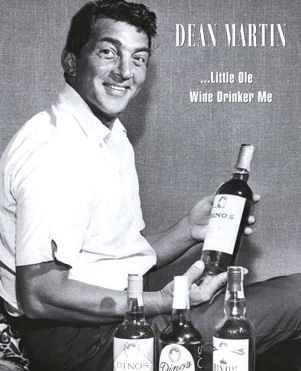
Dean Martin
Whatever the real truth and whomever she may actually be, Aniston is the good wife who got fucked over. It’s hard, but the public persona of some actors and actresses is so deeply imbedded that they can’t be absorbed into in certain roles..period.
Frank Sinatra as a priest in The Miracle of the Bells…get outta town.
Or John Wayne as Genghis Khan or, much worse, as a Roman Centurion standing at the foot of the cross while Jesus is dying in The Greatest Story Ever Told and saying, “This was truly the son of God.”
There must be dozens of other head-slappers. Send ’em in, please.
Ten Years and Two Weeks
I’m a Terrence Malick fanatic from way back, and it’s the nostalgia factor more than anything else that has me especially excited about seeing The New World (New Line, 12.25), which Malick wrote and directed.
I’m also one of the only journalists to have any kind of conversation with Malick since he went into his Thomas Pynchon withdrawal about 17 years ago (right after the release of Days of Heaven) and became this gentle phantom-like figure whom journalists couldn’t get to under any circumstance.
In this context speaking to Malick on the phone– which I managed to do on Octo- ber 25, 1995, around 11:35 am — was like snapping a photo of Bigfoot. It was a half-pleasant, half-awkward, quite meaningless conversation, but at least he picked up the phone.
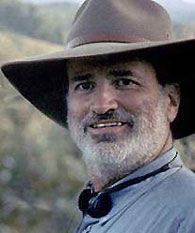
Terrence Malick during filming of The Thin Red Line
Malick had been staying with producer Mike Medavoy, who wound up producing The Thin Red Line, but Medavoy was leaving for Shanghai and Malick would be staying elsewhere, so I called to get a forwarding number.
A cleaning woman answered and said Medavoy was out, but that Malick was nearby. She asked me to hold…
Malick: Hi.
Me: Hi, Terry. This is Jeffrey Wells speaking…
Malick: Hi.
Me: And uhh…I was just talking to Mike last night and he said, uh, you might be leaving today and I wanted to see if I could speak with you about an article I’m researching. It’s for Los Angeles magazine and my editor…he worked on that piece about ten years ago with David Handleman for California magazine. It was called “Absence of Malick.”
Malick: Yeah.
Me: I don’t know if…did you happen to read it?
Malick: No, I…I…uhnn…
Me: Anyway, I’m doing this piece and trying to sort things through here. About what’s going on with…well, to start with, The Thin Red Line and that rumored BAM stage production of “Sansho the Bailiff” and…I’ve wanted to speak with you about it, and now that I’m speaking with you I feel…well, I feel nervous.
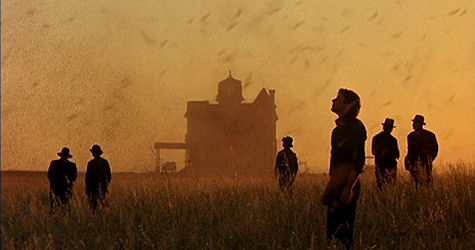
Locust arrival scene in Terrence Malick’s Days of Heaven
Malick: Don’t be, Jeffrey. It’s not that. I just don’t feel comfortable talking about it yet.
Me: About Red Line, you mean?
Malick: Yeah and…it’s something that has no date, really. It may happen some- time in the indefinite future.
Me: The indefinite future? Uh-huh. So there’s no approximate, long-range plan at all? It’s not even on a low flame?
Malick: I…I’m…uhmm.
Me: I was only thinking, you know…heh-heh… ‘indefinite future.’ You could say the same thing about the sun collapsing and the end of the solar system, heh-heh.
Malick: Uhhmm…
Me: I’m only mentioning this because…well, you may have seen that item in Pre- miere that you said you had this reading of the script with Costner and Lucas Haas and Ethan Hawke.
Malick: We did it just to get a sense of how it flowed.
Me: How did it flow?
Malick: I just don’t feel comfortable talking about it. I appreciate your interest but…
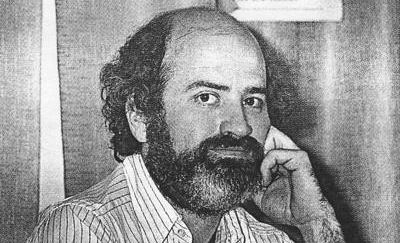
Malick in 1979
Malick: Mike says you’re on the second or third draft, something…it’s a work that’s been through some development and progression, and…
Malick: I….
Malick: I dont want to grill you, Terry. Mike explained the rules and said that grilling you…’that’s the one thing we don’t do’…and I understand that. I had a hope, though, of just discussing movies in general…ones you’ve seen and been impressed by in recent years.
Malick: Well, I appreciate your interest. I guess I do feel uncomfortable talking right now.
Me: I’m just one of…who knows, hundreds of film journalists around the country who regard you as one of the best ever and have watched your films over and over.
Malick: You’re very kind, Jeffrey. I appreciate it and I feel it and it comes to me as very encouraging. But I feel uncomfortable talking about it. I spoke to my brother Chris and he said that you’re just trying to help. And of course I know you’re just trying to do your job.
Me: I was actually just reading about a new laser disc of Days of Heaven that’s coming out, and it’s really something I’m looking forward to because I’ve never seen a print of that film that equalled the first viewing at the Cinema 1 in New York when they showed a 70mm print with six-channel sound, and having a…are you a laser-disc aficionado?
Malick: I’m, uh…not..uh…
Me: Are you…you don’t watch TV? Videos? Do you ever catch movies on tape?
Malick: I’d be happy to talk to you at some later point, Jeffrey.
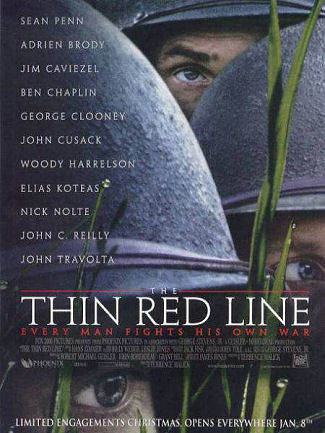
Me: I know. I understand know what the rules are.
Malick: And someone actually is here, Jeffrey, and I do have to keep an appointment. I would love to, later on…we could talk.
Me: I’ll look forward to it. I understand you’re in town for a few more days.
Malick: Yes, but I really do have to go now.
Me: Because if you have a moment later on, I’d like to run some basic points by you and just go over them one by one, for accuracy’s sake.
Me: I can’t really talk about this. I know what you’re trying to do and it’s not…if you’d try to understand. Chris told me you’d written and that you were trying to help.
Me: Well, I hope you have a good stay. I look forward to chatting again on a more…uhm, relaxed basis.
Malick: Okay, thank you.












